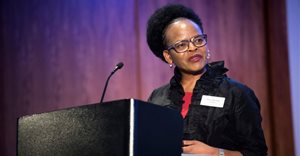
Subscribe & Follow
The role of language in improving financial literacy and building better schools

Ten minutes was all Nxasana had to share his impressive overview of the subject closest to his heart. As founder the Future Nation Schools concept, as well as co-founder of the National Education Collaboration Trust or NECT, providing South African children with the skills, knowledge and attitudes required to live economically gainful and fulfilled lives has become his life’s work.
Language and the socio-economic impact on education
According to Nxasana solution can’t be discussed without understanding the Fourth Industrial Revolution (4IR). After all, we need young people who can think and solve problems, work with others and understand the importance of technology if they are going to succeed today.
Unfortunately, disparity is high in the Education Commission’s 2012 PISA study, with projected learning outcomes for 2030 reflecting the impact of learners’ socio-economic status on their creative problem-solving. While 70% of learners take in the minimum secondary level skills in high-income countries, the figure drops to 49% in middle-income countries and just 8% in low-income countries. This reflects a real problem when it comes to students learning the skills required to get ahead in the context of the 21st Century.
Nxasana also spoke to one of the biggest elephants in the room and one of the main reasons for this skills discrepancy – the bulk of Africans learners are not being taught in their home language.
This puts the common complaint that kids don’t read for meaning into context. He shared that while teaching the concept of Vat to the Grade 8s in the classroom, the students asked what he meant by ‘vendors’, so spent five minutes explaining the concept. Later in the lesson, he also had to describe what is meant by the terms ‘deemed’ and ‘miscellaneous items’.
So in a 40-minute long lesson, Nxasana spent 15 minutes just negotiating meaning of terms the bulk of the students had not come across before, as they’re not being taught in their home language. Proof that unless we solve for the problem of language, the problems in education will persist.
The abstract, a step further removed…
Research shows the burden of foreign languages as the language of learning and teaching, as children are more active, think more critically and create an entirely different classroom atmosphere when taught in their mother tongue.
Just 4% of African students are taught in their first language, which means they’re not equipped to read for meaning. Nxasana adds that knowledge is not just transferred at schools but also in homes and churches, but when you’re using a language that’s not spoken in the homes of the teachers themselves, let alone by their parents, you essentially disintermediate these elders as they battle to unpack abstract concepts in a language not their mother tongue.
Unfortunately, that’s why the skills inequality gap is growing at a faster pace in the 21st century, especially in the context of the 4IR, in light of the twin problems of skills inequality and skills uncertainty.
Nxasana quoted from Sean F Reardon and Ximena A Portilla’s work for the Brookings Institute on ‘Recent trends in income, racial and ethical school-readiness gaps at kindergarten entry' as follows: “… at the current pace of change, skills inequality is not going to be solved any time soon. In fact, we found that it will take approximately a century for girls and boys in poor countries to catch up to today’s education levels in rich countries.”
Nxasana paired these findings from the Brookings Institute with those of the Education Commission mentioned earlier, which show that more than half of the world’s two billion children will not be on track to achieve basic skills ranging from literacy to numeracy, problem solving and critical thinking at secondary level in the next decade.
Offering the next generation the skills of the future
Taken from the perspective of qualifications and competency frameworks, Nxasana says there’s a lag between qualifications and skills needed for the future. To address this, the developing world’s education system needs to go beyond teaching knowledge, but does not yet have the tools to take summative and broadly comparative measures of non-academic skills. Can they count? Can they use a computer? Can they read? Can they understand what they’re doing? We need to go beyond the basic competencies of numeracy literacy, as the gap continues to widen.
It was for this reason that Nxasana cofounded the NECT five years ago in collaboration with the department of basic education, National Reading Coalition, Read to Lead and the 2030 National Development Plan. It brings the private sector to the table to address these fundamental issues we face as a collective, because education is a societal issue, so not only government alone can solve the problem.
NECT aims to mobilise national capacity to assist government to achieve distinctive, substantial and sustainable improvements in education beyond certification, to offer the competencies required to navigate a very complex and fast-changing world, especially when it comes to the world of work.
Providing further insight into where the world is going, Nxasana spoke of the hand-held devices that we now take for granted. As a result, there are a host of high-paying jobs of today simply didn’t exist a decade ago. These include data analytics directors, user experience executives, heads of sustainability, mobile app developers, web analysts and wearable tech engineers, and we need to prepare young people for these future opportunities.
Nxasana says the Future Nation Schools model offers a real 21st-century education through the overlap of modernised disciplines and the necessary intermediary knowledge; coupled with skills and competencies in creativity, critical thinking, communication and collaboration needed to solve real-world, topical problems on the ground; as well as building a character of mindfulness, curiosity, courage, resilience ethics and leadership; all in the broader ‘meta learning’ sphere encompassed in a growth mindset and meta cognition.
This is brought to life in the classroom when discussing issues in a project-based learning format on subjects like building houses to withstand extreme weather conditions when touching on climate change. Bringing in the relevance of real world challenges shows the importance of this new way of thinking about teaching, as opposed to simply teaching abstract concepts in the classroom that don’t necessarily translate beyond the textbook.
This gives Future Nation Schools’ students the required content knowledge and skills, as well as employability as they tackle 12 subjects in critical modern disciplines beyond the core curriculum, through leadership and entrepreneurship skills, blockchain technology, coding and robotics, data analytics, artificial intelligence, virtual and augmented reality. This enhances their global literacy, information literacy, environmental literacy, digital literacy and systems and design thinking, with outstanding results.
“We can’t have all these kids graduate and wait for a job to fall into their hands. We have to create job makers,” said Nxasana. Through the Future Nation Schools and NECT, South Africa will soon see the fruits of this labour.
Catch Nxasana’s full presentation from SAICA’s Nation Building Summit here: https://www.youtube.com/watch?v=ML23VWbClSU&t=25s.
- Audit Quality Indicators for auditor authorisation within medical schemes industry11 Dec 16:51
- The imperative of cyber resilience in an era of escalating threats10 Dec 16:21
- Saica replaces 'accredited' with 'endorsed' on qualifications underlying the CA(SA) and AGA(SA) designations10 Dec 13:22
- How excessive government controls harm employees and processes06 Dec 15:30
- The upcoming debate on confidentiality and beneficial ownership28 Oct 13:34














